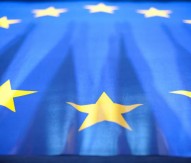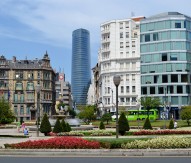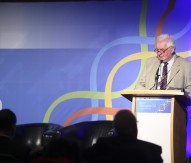
Innovation 2.0: Reinventing the Irish economy
Once described as the ‘Celtic Tiger’, Ireland has had to reinvent itself following the banking crisis and the collapse of its construction sector. The Irish government has focused significant resources on changing the landscape of the country’s economy in order to weather the economic challenges it has, and still continues, to face.
Addressing delegates at the ‘Open Innovation 2.0’ conference at Dublin Castle and attended by Pan European Networks, Richard Bruton, the Irish Minister for Jobs, Enterprise and Innovation, outlined how innovation and R&D, the core of Horizon 2020, as well as free trade, is the only way to regain economic momentum.
Bruton began his speech by quoting another. President José Manuel Barroso had recently said: “If Europe wants to deal with this crisis we have to do it in a very open way – the Euro-protectionism…and hoping to survive by continuing to do things the way we have always done is now gone. It is very much about opening up our borders in terms of trade and being open to new free trade agreements. It is also about exploiting the opportunities created by internet and the digital economy. It’s also about opening up our own markets and developing the Single Market, which has still failed to be completed within Europe. Across those three items alone, it is estimated that we could generate 10% of the GDP by steady implementation of those three areas – digital, Single Market and trade. A 10% growth rate, at a time when 26 million people are out of work, is a goal that we must strive for and we must, I think, completely reorient our economies and our public policy in order to do so.”
And so Minister Bruton continued by outlining how Ireland has had to radically transform its economy in order to foster economic growth in light of the financial crisis, leading to new paradigms of innovation and global opportunity.
“As some of you may know, we’ve had a 15% fall in employment as a result of the crash of property and our financial sector. We have had to undertake very rapid transition from an economy that had become too focused on construction and property to one that’s built essentially on innovation on exports and enterprise.
“It’s happening in energy, it’s happening in healthcare, it’s happening right through consumer behaviour; there is a dramatic change,” said the minister. “It is about accessing the intelligence of the masses…and I think this new technology has seen the emergence of the fearless entrepreneur who can go global from the very first day…it’s the power and potential of this new environment in which we’re working. In Ireland, we see businesses that open themselves up to the possibilities of research and development and export markets grow more than twice as fast. Those that do not ultimately see their market share dwindle away and their very existence comes under pressure.”
During its six-month Presidency of the Council of the European Union, Ireland’s priories have been encouraging economic stability and growth and the creation of new jobs in Europe. This goal can only be achieved, according to Bruton, through co-operation.
“This is a huge challenge for people, like myself, in the policy making role. We have to break out of the silos where we tend to be fairly comfortable and address one another’s concerns in new ways. We try to do that in Ireland with our investment in research. The government has, over a number of years, lived to fight a credible and critical mass of effort in investment and research through our institutes of education – I think that we’re in the top 20 now in terms of the European Innovation Scoreboard and for our size, we’re probably pushing ahead of our weight. Yet we’re not satisfied and are demanding that those engaged in research would have a much more open collaboration with industry in order to continue to get their share of funding and I think the notion that you are bringing in outsiders is very much part of the thinking that we have and how we use our research.”
A goal of Horizon 2020 is the development of new skilled jobs, an aim shared by the Irish government and exemplified by changes in the healthcare sector. It’s hoped the new framework programme will address the valley of death after the failure of many new products during the innovation stage.
“We’ve developed an action plan for jobs. When you’ve lost 15% of your workforce and many of your workforce have either emigrated or become unemployed, you are absolutely committed to jobs as a top priority. In the area of health, we’re developing a health innovation hub which is essentially to recognise that, yes we have very good hospitals with very good consultants and professors of medicine and teaching, but we also have very exciting companies where collaboration can succeed. If we can get new technologies test-bedded in our hospitals, you can get a reference saying that then allows that company to make the next step on.
“We need to start thinking about how we get smarter ways of funding. It is disheartening to see that out of all the new ideas across Europe, only one sixth of them are commercialised. We are losing out if those ideas do not get applied commercially and help to change people’s lives – those ideas remain stilted and underdeveloped,” the Minister commented.
“I think there are many dimensions to realise the challenge and the opportunity that President Barroso has addressed and that is the real the task of governments. We are approaching these challenges collaboratively and we have developed technology centres where we seek to work with large multinational companies and SMEs to address the common challenges we face. I think that the concept of working across borders is going to be absolutely crucial if we are to exploit these opportunities and return the EU to economic growth, and with that, bring 26 million people back into realistic opportunities to develop their potential to the full.”
“If research is about turning money into knowledge, innovation is about turning knowledge back into money,” Bruton added. “This is an important message but it’s much wider than just a money dimension – it is also about the sustainability of the way we live, our ability to harness opportunity for citizens to better manage their own and the way they interact with their communities and with the wider world.”
Richard Bruton





